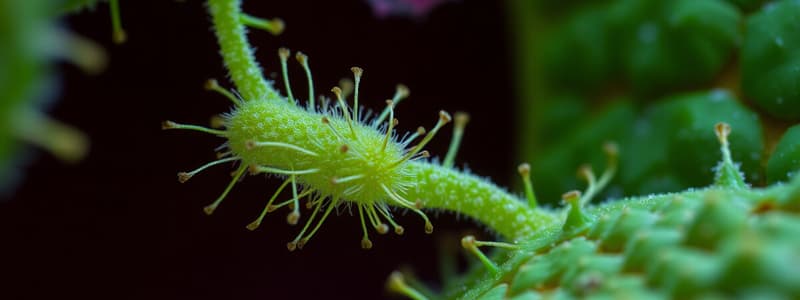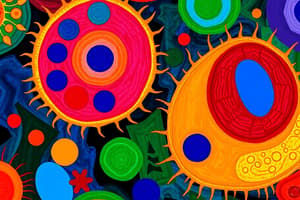Podcast
Questions and Answers
What process do living organisms utilize to ensure the continuation of their species?
What process do living organisms utilize to ensure the continuation of their species?
- Metabolism
- Respiration
- Photosynthesis
- Reproduction (correct)
Which level of biological organization is considered the basic unit of life?
Which level of biological organization is considered the basic unit of life?
- Cell (correct)
- Molecule
- Atom
- Tissue
What type of biological molecule primarily serves as a source of energy?
What type of biological molecule primarily serves as a source of energy?
- Carbohydrates (correct)
- Nucleic Acids
- Proteins
- Lipids
In what form do living organisms pass on their genetic information to their offspring?
In what form do living organisms pass on their genetic information to their offspring?
Which group represents a community in the levels of biological organization?
Which group represents a community in the levels of biological organization?
What is the primary focus of microbiology?
What is the primary focus of microbiology?
Which of the following best describes homeostasis?
Which of the following best describes homeostasis?
Which branch of biology focuses on the study of genes and heredity?
Which branch of biology focuses on the study of genes and heredity?
What does the cell theory state?
What does the cell theory state?
Which of the following is a characteristic of living organisms?
Which of the following is a characteristic of living organisms?
What is metabolism in the context of biology?
What is metabolism in the context of biology?
Which process describes organisms changing over time through natural selection?
Which process describes organisms changing over time through natural selection?
Which branch of biology primarily studies plant life?
Which branch of biology primarily studies plant life?
Flashcards
Biology definition
Biology definition
The scientific study of life and living organisms.
Cell Theory
Cell Theory
All living things are made of cells, and new cells come from pre-existing cells.
Evolution
Evolution
Change in populations over time driven by natural selection.
Homeostasis
Homeostasis
Signup and view all the flashcards
Metabolism
Metabolism
Signup and view all the flashcards
Botany
Botany
Signup and view all the flashcards
Adaptation
Adaptation
Signup and view all the flashcards
Growth/Development
Growth/Development
Signup and view all the flashcards
Reproduction
Reproduction
Signup and view all the flashcards
Heredity
Heredity
Signup and view all the flashcards
Biological Molecule
Biological Molecule
Signup and view all the flashcards
Cell
Cell
Signup and view all the flashcards
Carbohydrates
Carbohydrates
Signup and view all the flashcards
Study Notes
Introduction to Biology
- Biology is the scientific study of life and living organisms.
- It encompasses a wide range of topics, including the structure, function, growth, origin, evolution, and distribution of living things.
- Biology is a vast and complex field, with many interconnected concepts.
Branches of Biology
- Botany: The study of plants.
- Zoology: The study of animals.
- Microbiology: The study of microscopic organisms, such as bacteria, fungi, and viruses.
- Genetics: The study of genes, heredity, and variation in organisms.
- Ecology: The study of the interactions between organisms and their environment.
- Physiology: The study of the functions of living organisms and their parts.
- Molecular Biology: The study of biological molecules, such as DNA, RNA, and proteins.
- Cell Biology: The study of the cell, the fundamental unit of life.
Key Concepts in Biology
- The Cell Theory: This theory states that all living organisms are composed of cells, and that new cells come from pre-existing cells.
- Evolution: The process by which populations of organisms change over time. This change is driven by natural selection, which favors traits that enhance survival and reproduction.
- Homeostasis: The maintenance of a stable internal environment in an organism, despite changes in the external environment.
- Metabolism: The sum of all chemical reactions that occur within an organism. This includes the processes of obtaining and using energy.
- Genetics: The study of genes, which are segments of DNA that carry the instructions for building and maintaining an organism.
Fundamental Characteristics of Life
- Organization: Living organisms exhibit a complex hierarchical organizational structure, from atoms to molecules, cells, tissues, organs, organ systems, and ultimately, the organism itself.
- Growth and Development: Living organisms increase in size and complexity during their lifespan through cellular growth and division.
- Metabolism: The sum total of all chemical reactions occurring within an organism. These include both catabolism (breakdown of molecules) and anabolism (synthesis of molecules).
- Adaptation: Organisms adapt to their environment over time. This adaptability is due to genetic variations and natural selection.
- Response to Stimuli: Living organisms react to internal or external stimuli. For instance, plants respond to light, and animals respond to touch or other stimuli.
- Reproduction: Living organisms produce offspring, ensuring the continuation of their species. This can be sexual or asexual.
- Heredity: Living organisms pass on their genetic information (DNA) to their offspring, resulting in shared characteristics.
Levels of Biological Organization.
- Atom: The smallest unit of matter.
- Molecule and Macromolecule: Groups of atoms bonded together; large biological molecules such as proteins and carbohydrates.
- Cell: The basic unit of life.
- Tissue: A group of similar cells working together towards a common function.
- Organ: A structure of different tissues working together to achieve a specific function.
- Organ System: A group of organs that work together for a common function.
- Organism: An individual living thing.
- Population: A group of individuals of the same species living in the same area.
- Community: A group of different populations interacting in the same area.
- Ecosystem: A community of organisms and their physical environment interacting.
Important Biological Molecules
- Carbohydrates: Provide energy. Examples include Glucose, Starch, and Cellulose.
- Lipids: Store energy, form cell membranes, and provide insulation. Examples include Fats, Oils, and Steroids.
- Proteins: Carry out a multitude of functions in the body; Examples include Enzymes, Antibodies, and Hormones.
- Nucleic Acids: DNA and RNA store and transmit genetic information.
Studying That Suits You
Use AI to generate personalized quizzes and flashcards to suit your learning preferences.



